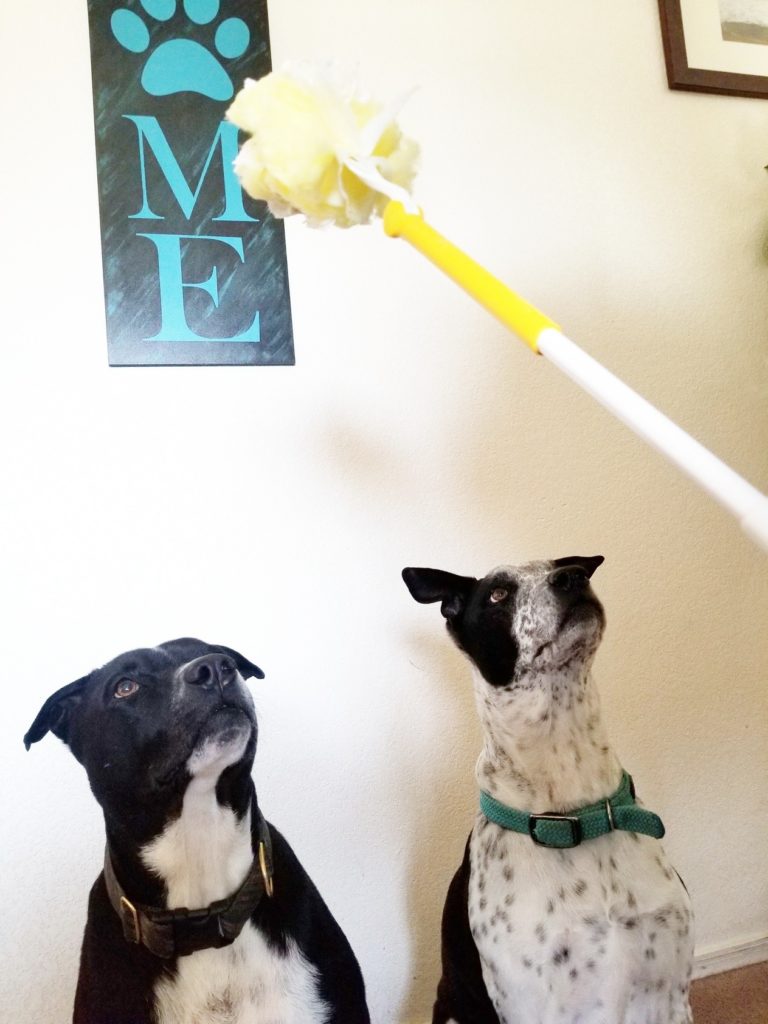Natural Ways to Soothe Itchy Skin in Pets
Share

Does your dog seem to be engaged in a never-ending battle with itchy skin? Scratching, licking, allergies, skin conditions, and hot spots can make life miserable for all of you. Unfortunately, it’s not always easy to find the cause of these conditions. Sometimes, all we can do is treat the symptoms. Today, we’re going to take a look at potential causes of skin conditions, as well as some natural ways to soothe itchy skin in pets.
Food Allergies
Sometimes, the culprit is hiding in your dog’s bowl. Food allergies are much more prevalent in today’s dogs than we think. Years of feeding the same types of protein day in and day out can create sensitivities in pets.
The most common food allergens include beef, chicken, dairy, wheat, and soy. It’s definitely worth getting your pets tested for a variety of allergens/sensitivities. Fortunately, there have been tests developed that can identify sensitivities, like these Pet Food and Environmental Intolerance tests that you can easily do from home. We’ve reviewed a few of these tests and you can see a sample of the results here.
If sensitivity tests aren’t in your budget, elimination diets can also help identify the trigger. Elimination diets focus on replacing specific proteins (like beef) with other proteins (like fish). When you do these diet changes, remember that your pets may be ultra-sensitive to change, so do them slowly over a period of several days. You can learn more about doing an elimination diet trial here.
Food Sensitivities
Other sensitivities may also lie in the types of foods you are feeding. For example, lower quality foods that contain lots of fillers can be a problem. Specific grains may be a problem. You may need to explore a different type of food, or rotate the foods on a regular basis. You can also add fish oils, supplements and more to your pet’s regular diet. But, do it slowly so you’re not compounding the problems.
Consider switching your dog to a high-quality, limited-ingredient diet and see if it makes a difference. Boost your dog’s omega-3 fatty acids with a fish oil supplement. These essential fats can nourish the skin from within, reducing dryness and itchiness. Talk to your vet about the right dosage for your pup.

Environmental Allergies
Dust mites, pollen, and other allergens can trigger itchy skin. Wash your dog’s bedding regularly, vacuum frequently, and avoid harsh chemicals in your home to minimize environmental triggers.
Environmental allergies are unfortunately pretty common in pets. Believe it or not, dogs and cats can be very sensitive to a number of things in the home, including dust, fragrances, and even other pets. To see if this may be the case for your pets, you can try to do something similar to elimination tests. Begin removing any “artificial fragrances” like scent diffusers, powders, scented candles or oils.
You should also step up your cleaning routines to ensure your pets are not reacting to an excess of dust or dander buildup. Consider replacing carpets with easily washable rugs. Use a HEPA filter on your vacuum and make sure you are dusting frequently.

Parasites
Fleas, ticks and mites can also result in serious issues with your pets. In case you didn’t know, many pets are highly sensitive to mosquito bites. These pesky critters are notorious itch-makers. Regular parasite prevention is crucial, especially in flea and tick season.
NEVER use a flea or tick medication that isn’t from an authorized seller and PLEASE DON’T CHOOSE THE CHEAPEST OPTIONS!
Demodex mites are naturally present on dogs, but overgrowth can cause itching. Natural shampoos and medicated shampoos (as well as other treatments) can help keep them in check. Mange is another big issue with pets. Do your homework before attempting to treat these mites, as you can easily cause more problems should you use the wrong treatment.
Environment-Related Skin Conditions
If you live in a super dry climate (like the southwest) or a super humid climate (such as the southeast), there are quite literally thousands of skin conditions that can result in problems with pets. These are just a few of the more common issues:

- Dry Skin: Lack of moisture can lead to flaky, itchy skin. Humidifiers, gentle oatmeal baths, and omega-3 fatty acid supplements can help restore hydration.
- Yeast Infections: Overgrowth of yeast can cause itchy, red patches, often on the paws and belly. We always suggest trying DERMagic for pets first. But, should that be ineffective, antifungal medications will need to be prescribed by your vet to clear things up.
- Bacterial Infections: Skin wounds or allergies can open the door for bacterial infections, leading to redness, itching, and pus. Antibiotics and proper wound care are essential in these cases.
You can try a number of natural ways to treat basic skin conditions, like dry skin. Consider these for minor reactions:
- Salt Scrubs: This remedy is my personal favorite. You can buy a premade salt scrub (we only recommend the salt scrub from DERMagic) or make one yourself (but choose the proper salts). Let your pets soak in the tub after adding a generous amount of
- Oatmeal Baths: Nature’s ultimate itch relief, colloidal oatmeal baths are gentle and effective. Grind plain oatmeal into a powder (or just order colloidal oatmeal), add it to your dog’s bath, and let them soak for 10-15 minutes. Rinse thoroughly and pat dry. Bonus points for a post-bath oatmeal massage!
- Coconut Oil: This wonder oil is not just for cooking! Apply a thin layer of organic coconut oil directly to itchy spots or mix it with their shampoo for a moisturizing boost. Coconut oil’s anti-inflammatory and antibacterial properties can work wonders. You can also give your pets a teaspoon of coconut oil every few days to help improve their coat health (although a fish oil supplement can be much more beneficial).
- Apple Cider Vinegar Rinse: Dilute apple cider vinegar with water (1:4 ratio) and use it as a final rinse after bathing. The acidity can help balance your dog’s skin pH and soothe irritation.
- Chamomile or Green Tea Soaks: These soothing herbs are packed with anti-inflammatory goodness. Steep chamomile or green tea bags in warm water, let it cool, and use the liquid to compress itchy areas.
- Aloe Vera Gel: This natural anti-inflammatory can be applied directly to minor skin irritations for immediate relief. Just be sure to choose a dog-safe aloe vera product, as some varieties can be toxic.
Behavioral Conditions
Don’t forget the emotional side of health! Teething puppies and anxious dogs may scratch excessively due to stress or boredom. Provide plenty of chew toys for teething pups and offer calming activities like training or cuddles for anxious pets.
There are many calming activities and supplements to choose from. It’s always important to address the full picture instead of just one symptom. These are some ways you can naturally calm your pets.
- Music: Consider soothing the savage beast with music. Pet Acoustics has fantastic playlists that are proven to calm pets.
- CBD: There are some excellent CBD chews that have had an amazing ability to calm pets. Never give your pets anything with THC as it can result in death.
- Enrichment Mats: We love the new enrichment toys and lick mats from SodaPup. Keep your collection updated!
- Chew Toys: Chewing releases endorphins that can help calm your pet. Make sure they always have plenty of safe, fun chew toys around!
- Backyard Enrichment: This is another great way to keep pets calm and relaxed. Consider some fun backyard enrichment for your pets!

Hormonal Imbalances and Thyroid Conditions
There are a number of conditions that can cause skin conditions in pets. It’s crucial to note that various skin conditions can manifest similarly, and a proper diagnosis should be made by a veterinarian. If you notice any changes in your pet’s skin or coat, such as hair loss, redness, itching, or unusual lumps, it’s essential to seek veterinary attention promptly. A thorough examination, along with blood tests and other diagnostic tools, can help identify and address any underlying hormonal or thyroid issues causing skin problems in pets.
Hypothyroidism:
- Description: Hypothyroidism occurs when the thyroid gland doesn’t produce enough thyroid hormone.
- Skin Effects: Pets with hypothyroidism may develop dry, flaky skin, hair loss (alopecia), and thickening of the skin. The coat may become dull and brittle.
Hyperthyroidism
- Description: Hyperthyroidism is an overproduction of thyroid hormones.
- Skin Effects: Cats are more commonly affected by hyperthyroidism. Symptoms may include unkempt fur, excessive shedding, and poor skin and coat condition.
Cushing’s Disease (Hyperadrenocorticism)
- Description: Cushing’s disease results from excessive production of cortisol, often due to a pituitary or adrenal gland tumor.
- Skin Effects: Pets with Cushing’s disease may develop thin, fragile skin, and they may be prone to bruising. Hair loss, especially on the trunk, is common.
Addison’s Disease (Hypoadrenocorticism)
- Description: Addison’s disease occurs when the adrenal glands don’t produce enough hormones.
- Skin Effects: Pets with Addison’s disease may experience hyperpigmentation (darkening of the skin) and thinning of the fur. Skin may also become more susceptible to infections.
Diabetes Mellitus
- Description: Diabetes results from inadequate production or utilization of insulin.
- Skin Effects: Diabetic pets may be prone to skin infections, especially if the blood glucose levels are not well-controlled. Skin infections can lead to hair loss and discomfort.
Sex Hormone Imbalances
- Description: Imbalances in sex hormones, such as estrogen or testosterone, can occur and affect skin health.
- Skin Effects: Changes in coat texture, hair loss, and skin abnormalities may be observed. Mammary gland enlargement may occur in unspayed female dogs.
Unfortunately, there is not much that can be done for these conditions naturally. It’s important to get your pet into a veterinarian where they can conduct the proper tests, bloodwork and exams to test for these illnesses.
Remember, these natural remedies for mild itchiness. If your dog’s scratching is severe, persistent, or accompanied by other symptoms, always consult your veterinarian to rule out any underlying medical conditions. But, for mild conditions, natural remedies may be enough to provide you and your pets some relief.










